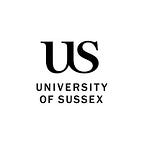“I haven’t always admitted to people that I’m deaf”
Dr Andrea Pepper is a senior lecturer in cancer research at the Brighton and Sussex Medical School, and is based on the University of Sussex campus. She is also profoundly deaf.
When I was three Mum caught me watching the television without the sound on. She thought that I wasn’t hearing very well, but when my parents spoke to specialists they said her speech is fine so she can’t be deaf. She and Dad took me to the Ear, Nose and Throat Hospital in London, where I was finally diagnosed. They think I was born with a bit of hearing and that it got worse.
Things are very different now for deaf children. When I was young there were schools for the deaf where you could learn sign language, but you didn’t do much in terms of qualifications. My parents wanted to me to go to a normal school — I went to a big comprehensive just outside Crawley — and Dad used to teach me in the evenings. I took nine O levels.
My dad was an amazing influence on me. He had climbed his own mountain to become a GP. He was from a very working-class family in Croydon and got a scholarship to do medicine back in the 1950s. So even though I was deaf, it never occurred to him that I shouldn’t have a career. He was a hard taskmaster. My parents were very easy going when it came to what I wore and make-up, but I couldn’t go out unless I had done my schoolwork.
I can’t sign — other than the little I learned in Brownies. My dad pointed out that most people can’t sign, so what else was I to do? I don’t have any friends who are deaf so I have to get by with lip reading, although it’s difficult with people who have beards, or strong accents.
For A level, I really quite liked history, but my dad said he could only do biology, chemistry, physics and maths so I had to choose out of those. He helped me all the way. I didn’t get really good A level grades. I went to a diagnostic haematology lab at St Thomas’s Hospital and did all my qualifications at evening school to become a qualified biomedical scientist.
My husband Chris is also at Sussex and together we’re I’m working on some very interesting projects. We are trying to discover how tumour cells, in particular leukaemia cells, migrate and move through the body, with the idea of developing drugs that stop that. I would like to retire having achieved that.
I have very powerful hearing aids so that I can hear noises. Without them I would hear nothing less than 100 decibels — which is the volume of a pneumatic drill. I could hear the beat of music when I was younger, but now I can’t. My 16-year-old daughter Amber puts on 1980s music and sings along so that I can lip read, and I remember those songs. Both my daughter and my son Edward, who’s 26, can lip read really well.
I haven’t always admitted to people that I’m deaf. From my experience, you want people to get to know you first before you actually start talking about your disability and your hearing loss. You don’t want to be ‘that deaf girl called Andrea’. You want to be ‘Andrea, who happens to be deaf’.
I’ve spotted a number of people with hearing difficulties around campus. For my colleagues who encounter these students, I would suggest that maybe the first thing to do is to think about always facing them when talking, and talking clearly. And maybe after a few weeks when the student has got used to them, to actually ask if there is anything you can do to help.
I have a research team so I have to be communicating with them all the time. I don’t do much undergraduate lecturing. If I stand in front of a big lecture theatre I would want it to be a two-way interaction, but it can’t be because I can’t hear and I can’t lip read from a distance. But I do as much PhD supervision and lab bench supervision as I can. If I go to a conference I have to let them know. I hate giving lectures because I might come to a word that I can remember how to spell, but I don’t know how to say. When it’s a new word my husband and daughter are forever breaking the word up for me. I struggle with words such as ‘synonym’ and ‘regime’. I tend to say them how they are spelt. Foreign words are impossible, although I know how to order a cappuccino or a latte!
I commuted to King’s College in London for 26 years, so it’s lovely now being on campus. I like to run in Stanmer Park, although I can’t run in the rain as it would damage my hearing aids, and if I take them out my balance isn’t good.
If you said to me would you like your hearing, or a holiday in New Zealand, I’d take the holiday. This is who I am. It’s very peaceful being deaf. The only time I really notice it is around half past three, when I’m exhausted from lip reading.
Interview by Jacqui Bealing
This profile is part of our This Sussex Life series.
Visit the University of Sussex website.
